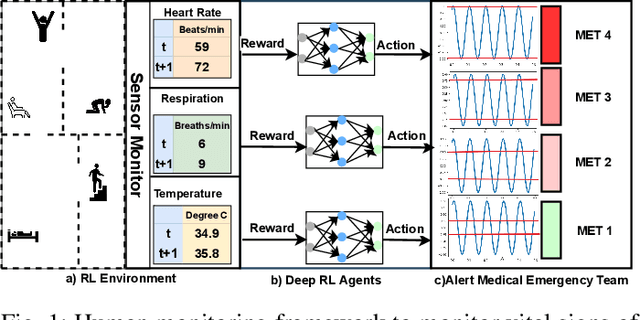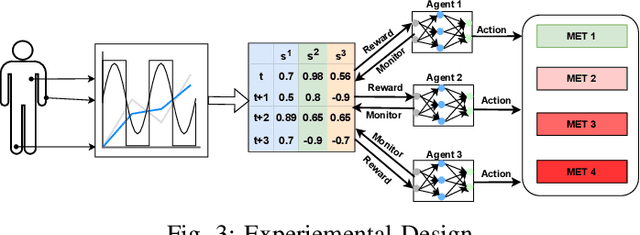AI-Driven Patient Monitoring with Multi-Agent Deep Reinforcement Learning
Paper and Code
Sep 24, 2023



Effective patient monitoring is vital for timely interventions and improved healthcare outcomes. Traditional monitoring systems often struggle to handle complex, dynamic environments with fluctuating vital signs, leading to delays in identifying critical conditions. To address this challenge, we propose a novel AI-driven patient monitoring framework using multi-agent deep reinforcement learning (DRL). Our approach deploys multiple learning agents, each dedicated to monitoring a specific physiological feature, such as heart rate, respiration, and temperature. These agents interact with a generic healthcare monitoring environment, learn the patients' behavior patterns, and make informed decisions to alert the corresponding Medical Emergency Teams (METs) based on the level of emergency estimated. In this study, we evaluate the performance of the proposed multi-agent DRL framework using real-world physiological and motion data from two datasets: PPG-DaLiA and WESAD. We compare the results with several baseline models, including Q-Learning, PPO, Actor-Critic, Double DQN, and DDPG, as well as monitoring frameworks like WISEML and CA-MAQL. Our experiments demonstrate that the proposed DRL approach outperforms all other baseline models, achieving more accurate monitoring of patient's vital signs. Furthermore, we conduct hyperparameter optimization to fine-tune the learning process of each agent. By optimizing hyperparameters, we enhance the learning rate and discount factor, thereby improving the agents' overall performance in monitoring patient health status. Our AI-driven patient monitoring system offers several advantages over traditional methods, including the ability to handle complex and uncertain environments, adapt to varying patient conditions, and make real-time decisions without external supervision.
 Add to Chrome
Add to Chrome Add to Firefox
Add to Firefox Add to Edge
Add to Edge